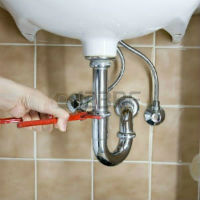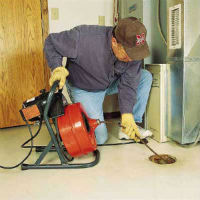If you are looking forward to becoming a plumber in the United States, you have two options: either join a formal training program in a trade school or opt for apprenticeship under a practicing plumber. The rules governing how to become a licensed plumber vary from state to state. In some states, all plumbers need to be licensed while in others, only specialist residential or commercial plumbers are required to obtain a license. As a plumber you can either establish your own business, work with a plumbing service firm, construction firm or local authorities. In Oklahoma, licenses for plumbers are regulated by the Oklahoma Construction Industries Board.
Apprenticeship
You must be at least 18 years old before you can join an apprenticeship program under a practicing Oklahoma city plumber. Other requirements are that the aspiring apprentice should be physically fit as well as have a high school diploma with credits in subjects like mathematics and English. If you meet these requirements, you can visit a plumbers OKC trade union office near you and ask if they have any of their members looking for an apprentice. You will be placed under the tutelage of a certified plumber and may be entitled to a wage. One of the most common tasks you will be performing is unclogging drains. A clogged drain is one of the top reasons customers call a plumbing expert.
During the course of your apprenticeship in Oklahoma City, you can meet with potential employers and explain your experience including all details of the apprenticeship program. While there are different requirements in each state, on the whole you need to have completed a specific number of hours of hands-on experience as a plumber not to mention specific plumbing courses before you can be licensed to be a plumber. However, in the State of Oklahoma you need about six years of full-time work combined with part time classroom learning to make the apprenticeship path to earning a license to work with plumbers OKC.
Formal Training in a Trade School

Trade schools training plumbers offer a formal educational program combined with regular hands on experience. Each trade school will have requirements for minimal educational attainment for those seeking to join. In any case though, it is often possible to earn your certification after training for two to three years.
By far, most licensed plumbers in Oklahoma learned their craft at a trade school in one form or another. This is because opportunities to train under apprenticeship are few and not well publicized. However, if you are intent enough to become an Oklahoma plumber under an apprenticeship arrangement, the best recourse is to call your local plumbing union and inquire if you can “job shadow” one of their plumbers to learn the trade. Keep in mind that there are different types of plumbers and as such you must establish if the one you are working under will give you the necessary experience for your preferred line of work.
Only a number of states require all plumbers to be licensed before they can start practicing their trade. It is therefore paramount to acquaint yourself with local rules governing how plumbers should operate before starting to offer your services. In certain states such as Oklahoma, you need to complete a plumbing licensing exam before receiving a license.
Such an exam includes a written test which gauges the applicant’s knowledge of the plumbing code in the state, safety issues and technical math. These stringent requirements have been put in place to improve the skill pool in the industry and to protect consumers as well. As such, it takes a certain amount of self drive, technical dexterity and dedication to become a successful plumber.
By becoming a plumber you will be placing yourself in place for a well paying job in a line of work whose services are in great demand. To ensure long term success, continue improving your skills and technical know-how even after receiving your license. You can accomplish this by taking courses in areas such as blue print reading, drafting, and business.

